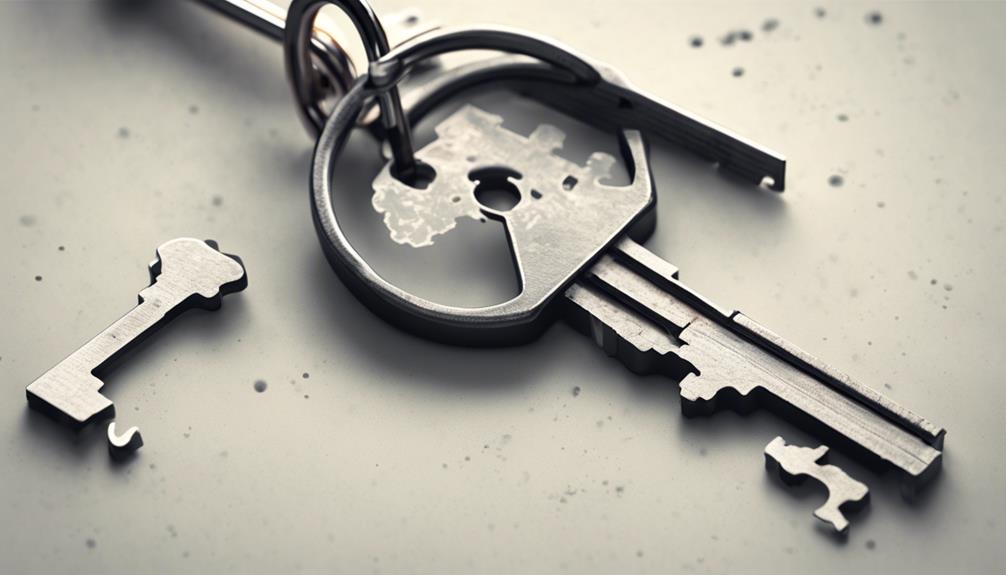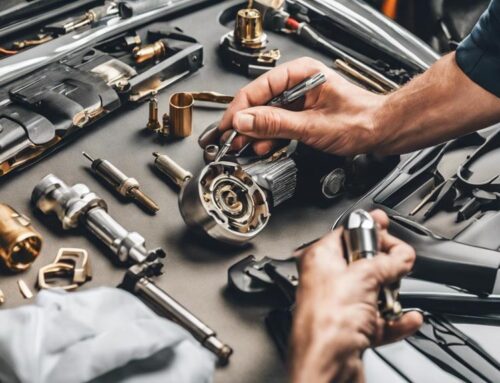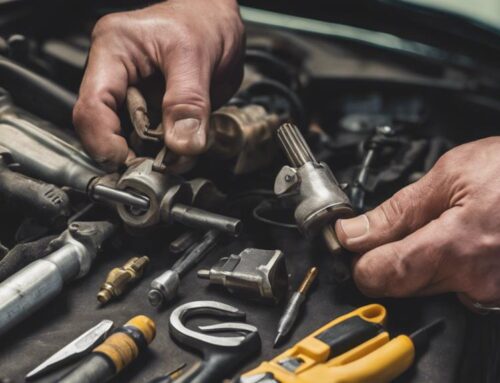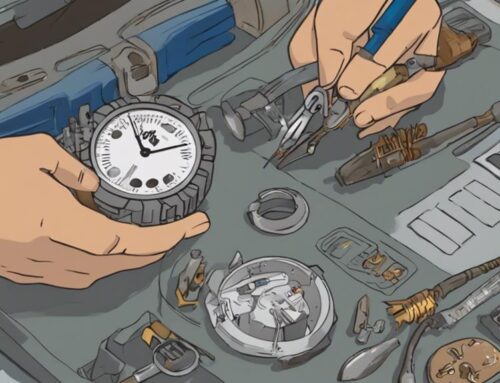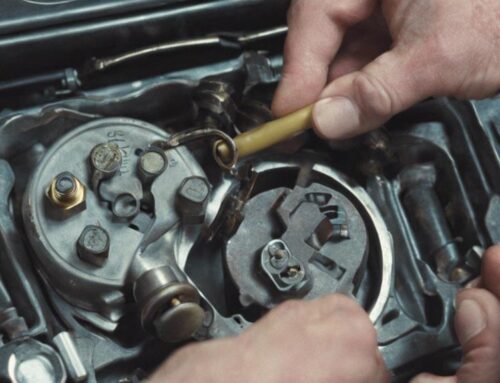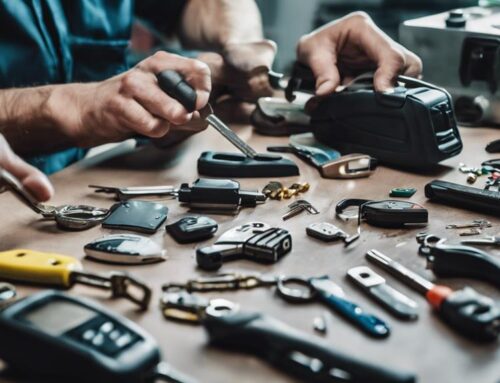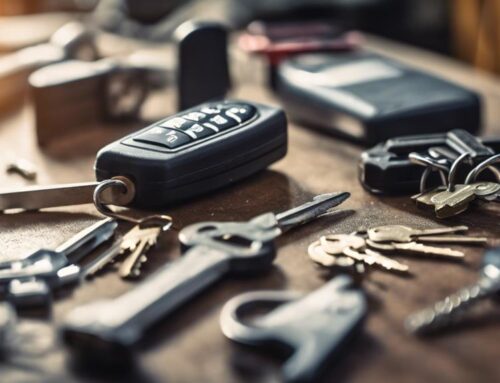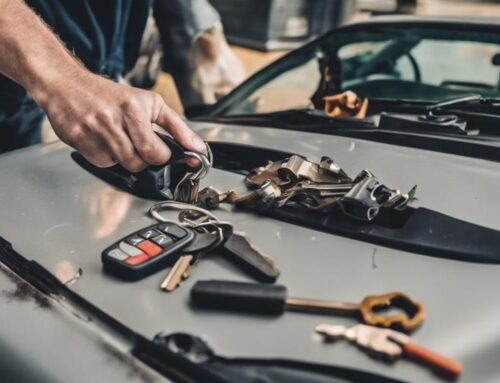To prevent keys from breaking inside locks, focus on key material durability, design flaws, and proper usage habits. Opt for brass or nickel silver keys, regularly inspect for cracks, and avoid applying excessive force while turning the key. Store keys away from magnets and extreme temperatures to maintain their integrity. Mindful handling, such as avoiding using keys for unintended purposes, can reduce breakage risks. Ensuring quality manufacturing standards and regular key maintenance, like cleaning and proper storage, also play a key role in preventing broken keys. These strategies contribute to maintaining lock functionality and security.
Key Takeaways
- Material weaknesses like cracks or sharp corners increase key breakage risk.
- Excessive force during turning stresses keys and locks; use gentle motions.
- Avoid storing keys near magnets or exposing them to extreme temperatures.
- Regular inspections and mindful handling prevent key breakage.
- Proper key design, quality materials, and maintenance reduce the risk of breakage.
Wear and Tear on Keys
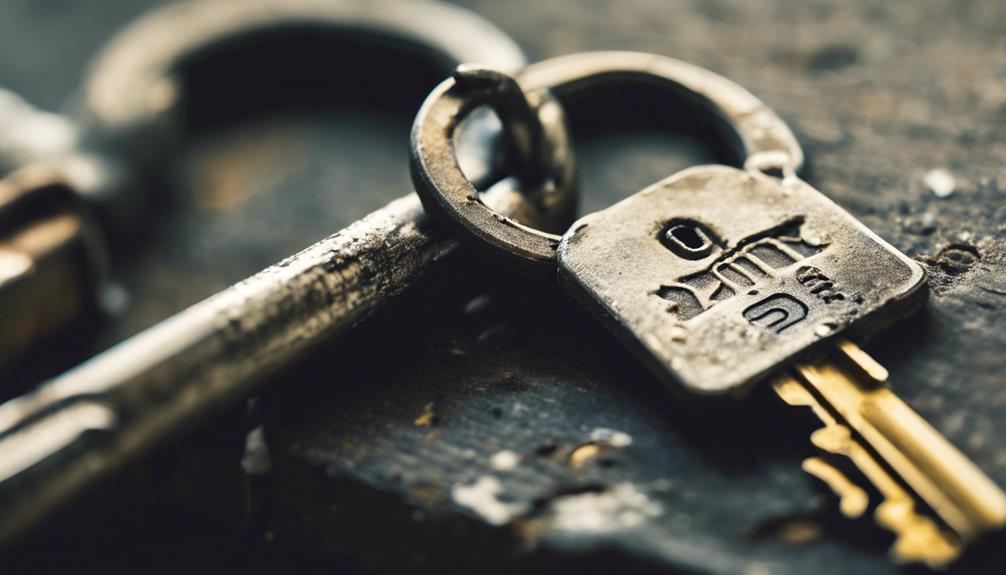
Keys are essential tools that we rely on daily, but they are not immune to wear and tear. Key material durability plays a significant role in how long your keys will last. Opt for keys made from sturdy materials like brass or nickel silver to decrease the chances of breakage. Additionally, be wary of key design flaws that can weaken the overall structure. Look out for keys with thin sections or sharp corners that are prone to snapping. Regularly inspect your keys for any signs of wear, such as cracks or bending. By being mindful of key material durability and design flaws, you can prevent the frustration of dealing with broken keys in your locks.
To learn more about key breakage and lock vulnerabilities, check out Understanding Key Breakage and Lock Vulnerabilities.
Rust or Corrosion in Locks
To prevent keys from breaking in locks, it is vital to address the issue of rust or corrosion in your lock mechanisms. Rust prevention tips include regular lubrication with graphite or silicone sprays and keeping locks dry to deter oxidation. The impact of corrosion can lead to difficulty in turning keys or even complete lock failure, emphasizing the importance of proactive maintenance. It is necessary to follow proper maintenance techniques outlined in the Essential Tips to Keep Your Locks Rust-Free and Functional prevention of rust to guarantee the longevity and functionality of your locks.
Rust Prevention Tips
To prevent rust or corrosion from forming in your locks, it is essential to implement effective rust prevention tips. Start by using rust-resistant materials like stainless steel for your keys and locks. Environmental factors play a significant role in causing rust, so keep your locks dry and lubricated with a silicone-based lubricant. Avoid exposing your locks to moisture for prolonged periods and consider installing a cover or awning to shield them from rain. Regularly inspect your locks for any signs of rust or corrosion, and address them promptly by cleaning with a rust remover and applying a protective coating. By following these practical tips, you can keep your locks in top condition and prevent the headache of dealing with rusty keys. Remember, knowing when to replace rusty locks is vital for maintaining security as discussed in a guide to security.
Impact of Corrosion
Rust and corrosion in locks can have a detrimental impact on their functionality and security. When these pesky culprits sneak into your lock, they can wreak havoc on the mechanisms, making it difficult for your key to smoothly navigate its way in and out. The effects of corrosion can cause your lock to jam, making it a real pain in the brass to open your door. Different lock materials can determine how susceptible they are to corrosion. For instance, brass and stainless steel locks are more resistant, while iron locks are more prone to rust. To prevent this lock drama, keep those locks dry and lubricated to keep the rust monsters at bay!
To learn more about preventing and repairing common lock failures, check out Preventing and Repairing Common Lock Failures.
Improper Key Usage
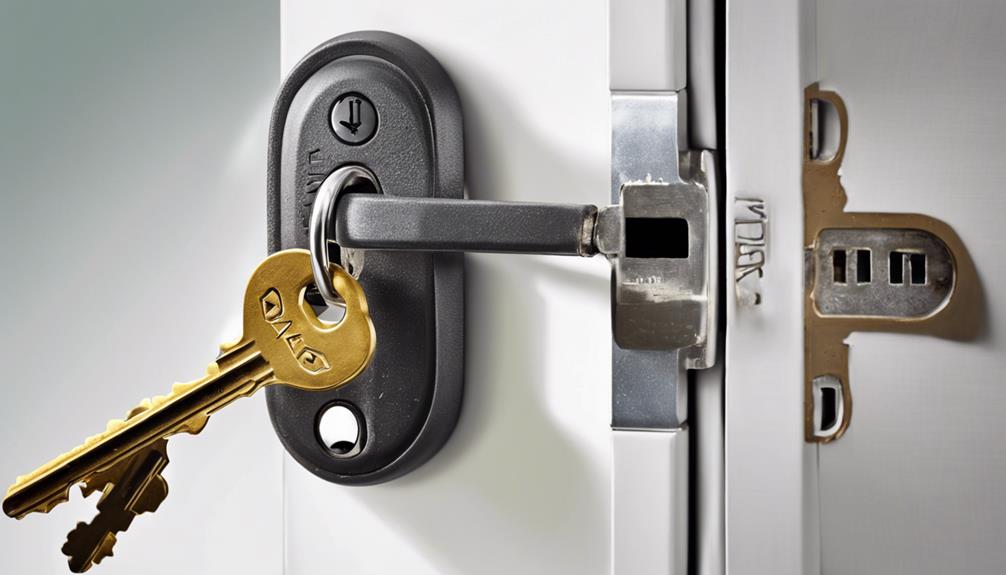
Improper key usage can greatly increase the likelihood of keys breaking in locks. Proper key handling is essential; avoid using excessive force when turning the key, as this can lead to unnecessary stress on the key and the lock mechanism. Remember not to use your key for any unintended purposes like opening bottles or prying objects, as this can weaken the key over time. When storing your keys, keep them away from magnets or other metal objects that could cause them to bend or break. Additionally, make sure to avoid leaving your keys in extreme temperatures, as this can also affect their structural integrity. By being mindful of how you handle and store your keys, you can reduce the chances of encountering a broken key situation. It's significant to highlight that taking these precautions can also help in preventing the need for professional assistance to remove a broken key from a lock.
Foreign Objects in Locks
When dealing with foreign objects in locks, it's essential to be mindful of any debris that may have accumulated in the keyhole. The impact of dirt and other particles can greatly affect the functionality of your lock, potentially leading to key breakage. To prevent such issues, always refrain from using substitutes for your keys, as they can introduce foreign objects into the lock mechanism, causing damage over time.
Debris in Keyhole
With the constant use of locks, it's important to verify that the keyhole remains free of any debris or foreign objects. Keeping your keyhole clean is vital in preventing keys from breaking inside locks. Here are some practical tips to maintain your keyhole and guarantee smooth operation:
| Debris Removal Tips | Keyhole Maintenance |
|---|---|
| Use compressed air to blow out debris | Regularly lubricate the lock |
| Gently clean the keyhole with a cotton swab | Inspect for any rust or corrosion |
| Avoid inserting damaged keys | Keep the area around the lock clean and dry |
| Consider using a key cover for protection | Replace worn-out keys promptly |
Impact of Dirt
Keys breaking in locks can often be attributed to various factors, one of which includes the presence of dirt and foreign objects within the lock mechanism. When it comes to the impact of dirt on your keys and locks, here are three things you should keep in mind:
- Key Cleaning: Regularly cleaning your keys can prevent dirt buildup, ensuring smooth operation.
- Lock Maintenance: Keep your locks well-maintained to reduce the chance of dirt accumulation inside the mechanism.
- Avoid Force: If you notice resistance when using your key, don't force it as it could push dirt further into the lock, increasing the likelihood of a breakage.
Avoid Using Substitutes
The use of substitutes or foreign objects in locks can lead to potential risks and complications that may result in key breakage. When it comes to your keys and locks, it's best to stick with the right materials and specifications. Locks are designed to work with specific keys for a reason, so save yourself the trouble and stick to using the proper keys for your locks. Additionally, avoid the temptation to use makeshift tools like bobby pins or paperclips to try and open a lock. These items can get stuck or cause damage, leading to broken keys and a whole lot of frustration. Remember, Mastering Sticking Locks can help prevent such mishaps.
Low-Quality or Faulty Locks
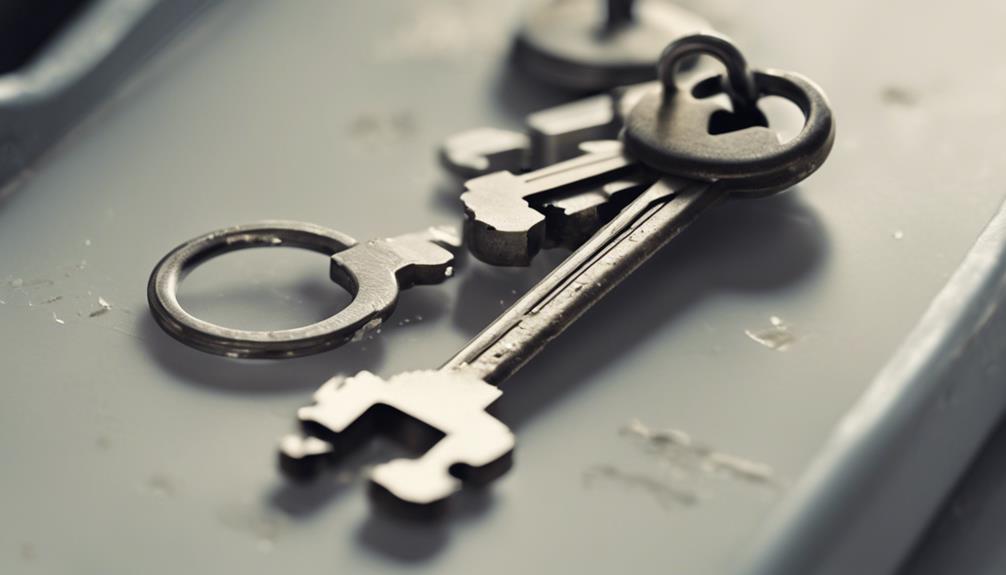
Quality and reliability are essential factors when it comes to the security of your property. When it comes to low-quality or faulty locks, you might encounter issues that could lead to broken keys. Here are some reasons why choosing the right lock is vital:
- Lock Materials: Opt for locks made from durable materials to withstand wear and tear, such as those used in high-security locks.
- Key Design: Look for locks with well-designed keyways to guarantee smooth operation.
- Manufacturing Standards: Choose locks from reputable brands known for high-quality manufacturing processes.
Extreme Temperatures Impact
Choosing the right lock for your property is not only about durability and reliability but also about considering factors like extreme temperatures impact. Temperature fluctuations can cause materials to expand and contract, affecting the precision of the lock mechanism. Thermal expansion, a fancy term for things getting bigger when it's hot and smaller when it's cold, can put stress on your keys and locks. To help you understand better, check out the table below:
| Extreme Temperature Impact | Description |
|---|---|
| Cold Weather | Lock mechanisms may stiffen, making it harder to turn the key. |
| Hot Weather | Materials expand, potentially leading to jammed locks. |
| Rapid Temperature Changes | Can cause wear and tear on the lock components. |
Understanding the impact of extreme temperatures on your locks can guide you in selecting the most suitable option for your environment.
Lack of Lubrication
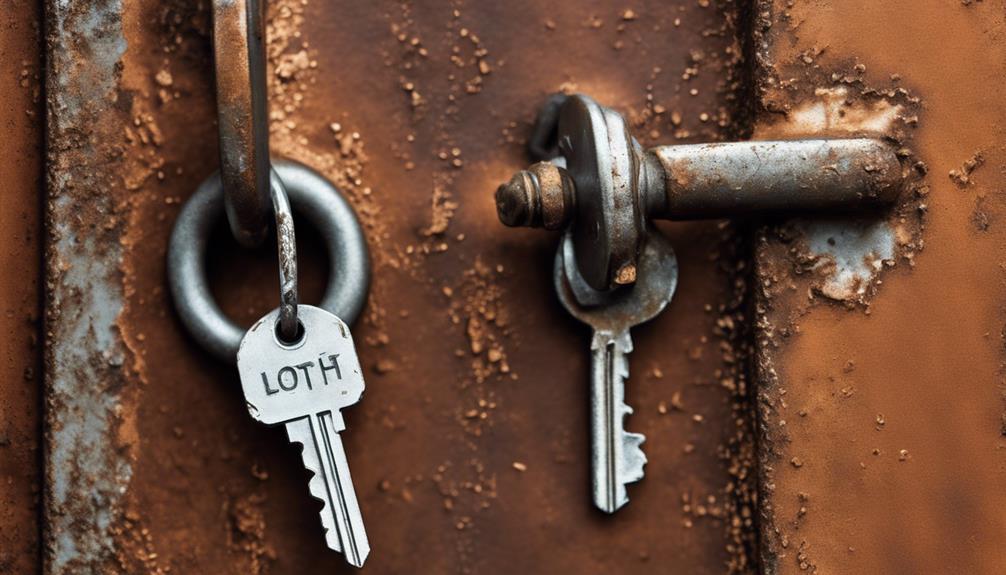
To prevent keys from breaking in locks, ensuring proper lubrication is essential. Understanding the different types of lubricants available and the correct techniques for applying them can greatly extend the life of your locks and keys. Regularly maintaining your locks with appropriate lubrication will help prevent unnecessary wear and potential breakage. Additionally, following important tips for long-lasting deadbolt maintenance, such as Essential Tips for Long-Lasting Deadbolt Maintenance, can further enhance the security and longevity of your locks.
Importance of Lubrication
Using the appropriate lubricant for your locks is vital in maintaining their functionality and preventing keys from breaking due to lack of lubrication. Regular lubrication reduces friction, allowing keys to slide in and out smoothly. Lubrication helps prevent rust and corrosion, prolonging the lifespan of your locks. Proper lubrication also guarantees that internal components operate seamlessly, reducing the risk of keys snapping inside the lock. Locksmiths often recommend using graphite powder as a lubricant choice for its effectiveness in keeping locks well-maintained.
Types of Lubricants
For ensuring the longevity and proper functionality of your locks, selecting the right lubricant is essential. When it comes to preventing keys from breaking inside locks due to lack of lubrication, you have a few options to choose from. Graphite powder is a classic choice, known for its ability to provide smooth operation without attracting dirt. Silicone spray is another popular option that offers excellent lubrication while also providing protection against moisture. Penetrating oil can be handy for loosening stuck components, but be cautious as it can attract dust and debris. Dry lubricants are a clean alternative, offering long-lasting lubrication without the mess. Choose wisely, and your locks will thank you for it!
Lubrication Application Techniques
When it comes to applying lubrication to prevent keys from breaking in locks due to lack of lubrication, the technique you use can greatly impact the effectiveness of the lubricant. To make certain your key maintenance is excellent, consider the following lubrication application techniques:
- Precision is Key: Apply the lubricant with care, targeting the keyway and avoiding excess drips. Remember, re-keying locks can also enhance security solutions and prevent key-related issues (Re-Keying Locks).
- Even Distribution: Make sure to spread the lubricant evenly across the key's surface to guarantee ideal coverage.
- Timing Matters: Apply lubricant regularly but don't overdo it; a little goes a long way in preventing key breakage.
Incorrect Key Insertion
Improperly inserting a key into a lock can lead to the key breaking, causing frustration and potential damage to the lock mechanism. Key alignment is essential for a successful entry – make certain the key is straight before trying to turn it. If the key design is intricate, take extra care not to force it in the wrong way. Remember, keys are like relationships – they work best when everything lines up perfectly. Avoid haphazardly shoving the key into the lock like you're trying to win a game of darts blindfolded. Take a moment to confirm the key slides in smoothly, and you'll save yourself the headache of dealing with a broken key stuck in the lock.
Attempted Forced Entry
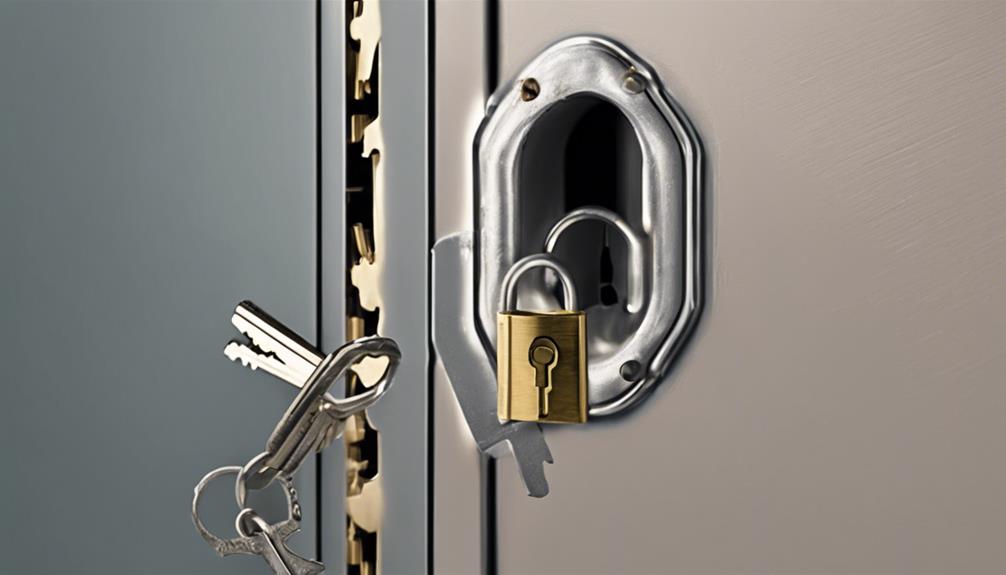
Attempting to forcefully enter a lock can result in irreparable damage not only to the key but also to the lock itself. When trying to break into a lock, consider the following:
- Locks are designed to withstand normal usage, not brute force.
- Security measures like alarms or security cameras can deter intruders from attempting forced entry.
- Emergency preparedness includes having spare keys or knowing a reliable locksmith to call in case of a lockout.
Tips for Key Maintenance
To maintain the functionality and longevity of your keys, regular upkeep and care are essential. Start by keeping your keys clean; dirt and grime can build up over time and affect their performance. Use a soft brush or cloth to gently clean your keys and prevent any debris from causing issues. Additionally, consider storing your keys properly to avoid bending or breaking. Avoid tossing them into bags with sharp objects or heavy items that could damage them. A designated key holder or a separate compartment in your bag can help protect your keys from unnecessary wear and tear. By incorporating these simple key cleaning and key storage practices, you can guarantee your keys stay in excellent condition for longer.
Conclusion
In summary, by regularly maintaining your keys, locks, and practicing proper usage, you can prevent the frustration of keys breaking inside locks. Keep your keys clean, lubricated, and free of wear and tear. Always insert your key gently and avoid using excessive force. Remember, a little care now can save you a lot of time and hassle in the future. Stay vigilant and proactive to guarantee smooth and hassle-free access to your locks.

